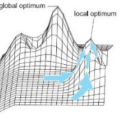Quantum and quantum-inspired optimisation algorithms are designed to solve problems represented in binary, quadratic and unconstrained form. Combinatorial optimisation problems are therefore often formulated as Quadratic Unconstrained Binary Optimisation Problems (QUBO) to solve them with these algorithms. Moreover, these QUBO solvers are often implemented using specialised hardware to achieve enormous speedups, e.g. Fujitsu's Digital Annealer (DA) and D-Wave's Quantum Annealer. However, these are single-objective solvers, while many real-world problems feature multiple conflicting objectives. Thus, a common practice when using these QUBO solvers is to scalarise such multi-objective problems into a sequence of single-objective problems. Due to design trade-offs of these solvers, formulating each scalarisation may require more time than finding a local optimum. We present the first attempt to extend the algorithm supporting a commercial QUBO solver as a multi-objective solver that is not based on scalarisation. The proposed multi-objective DA algorithm is validated on the bi-objective Quadratic Assignment Problem. We observe that algorithm performance significantly depends on the archiving strategy adopted, and that combining DA with non-scalarisation methods to optimise multiple objectives outperforms the current scalarised version of the DA in terms of final solution quality.
翻译:量子和量子驱动的优化算法旨在解决二进制、四进制和不受限制的形式中代表的问题。因此,组合优化问题往往被设计成“四进制、不受限制的二进制优化问题 ” (QUBO), 以便用这些算法解决这些问题。此外,这些QUBO解算器往往使用专门硬件实施,以实现巨大的快速化,例如藤津的数码Annaaler(DA)和D-Wave的Quantum Annaaler。然而,这些是单一目标解算器,而许多现实世界的问题则有多重冲突的目标。因此,使用这些QUBO解算器将这类多目标问题升级成单一目标的常见做法是将这类多目标问题纳入一系列的单一目标问题。由于设计了这些解算器的取舍,制定每个缩缩法可能需要更多的时间,而不是找到最终的本地最佳化。我们首次尝试扩大算法,支持商业QUBO解算器作为多目标解算器,而不是基于降级的多重目标解算方法,因此,在将目标化中,拟议的DAAL-DA- 将DA-qalalalalalisalisquel化为不相联的不化,因此将DAxxx。


